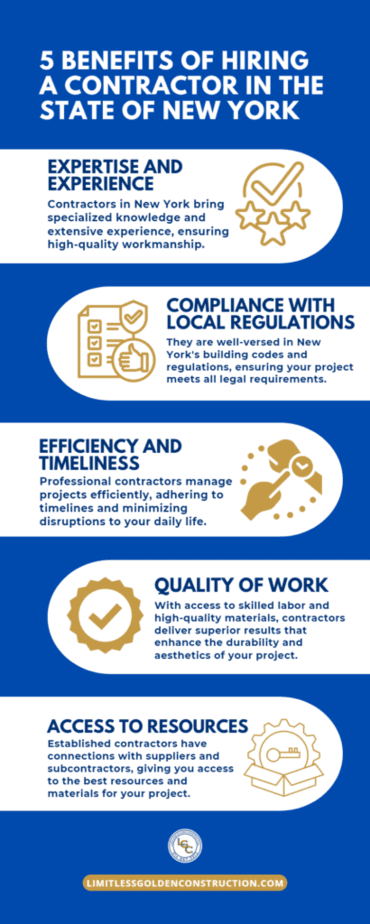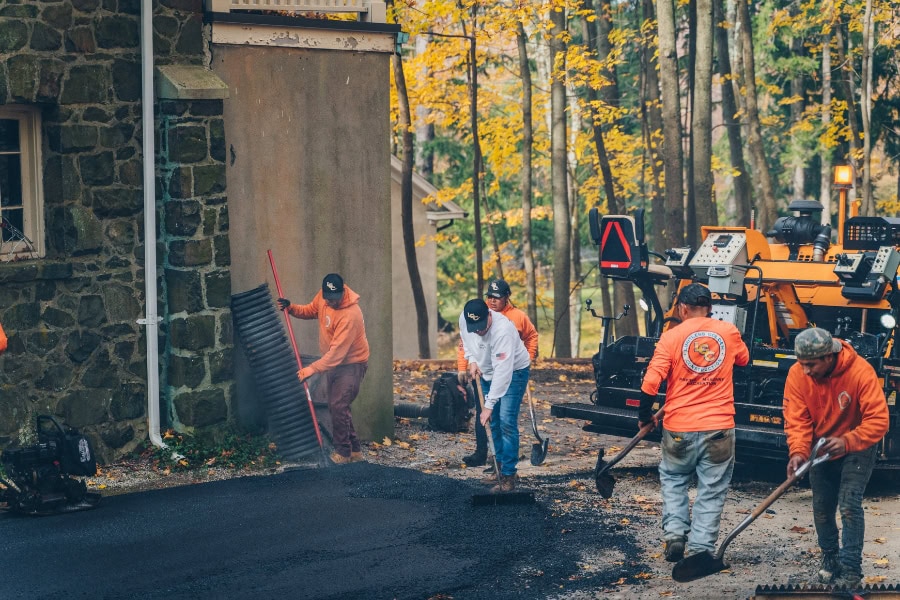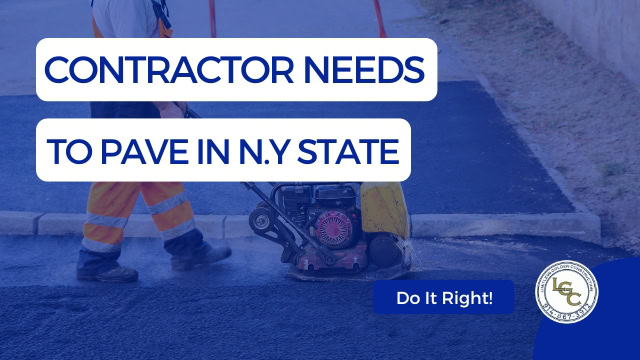When it comes to paving driveways or commercial properties in New York State, hiring the right contractor is crucial. Ensuring that your contractor has the necessary credentials, permits, and understanding of local regulations can make the difference between a smooth project and a logistical nightmare. This comprehensive guide will walk you through everything a contractor needs to have to pave in NY State, ensuring your project is in capable hands.

Paving & Driveway, What Does Your Contractor Need to Have?
Before breaking ground, it’s essential to understand the various requirements and preparations needed for paving projects. Here’s what to consider:
Liability, Workers’ Comp, and Disability Insurance
One of the first things to check is whether the contractor has liability insurance, workers’ compensation, and disability insurance. These protections are crucial for safeguarding both the contractor’s workforce and your property. Liability insurance covers any potential damage to your property, while workers’ comp and disability insurance protect the workers if they get injured on the job.
Home Improvement License of County
In NY State, contractors must hold a home improvement license specific to the county where the work will be performed. This ensures that the contractor is recognized by local authorities and complies with county-specific regulations. Always verify this license to avoid legal complications down the line.
How Long Do You Have to Wait for Your Permit?
Securing a permit is a critical step in the paving process. The time it takes to get a permit can vary depending on the municipality and the specifics of the project. On average, it can take anywhere from a few days to several weeks. It’s prudent to start this process early to avoid delays.
Understanding Seasons and Permit Requirements
Paving can be highly dependent on weather conditions, especially in NY State, where seasons can drastically affect the timeline. Understanding the best times of year for paving and aligning them with permit requirements can help in planning your project efficiently.
Is it a spring, summer, fall project, etc.? Because it takes a month to get the permit, so you can’t have a project done immediately due to the bureaucracy and permits.
Plan Ahead for Your Permit Needs
To avoid any last-minute hiccups, plan ahead for your permit needs. Consult us to understand the permit application process and timelines, and ensure all paperwork is submitted well in advance.
We recommend getting or trying to get your permit one season before when you want to do your project. For example, get your permit in spring for a summer project or contract your contractor in the summer for a fall project.
Do We Include Permit Fees on Our Quotes?
Clear and upfront communication is key in ensuring there are no surprises when it comes to costs. Reputable contractors like we have in Limitless Golden Construction will include permit fees in their quotes, providing a comprehensive view of the project’s financial requirements. Always ask if permit fees are included in the initial quote to avoid unexpected expenses.
If we do the permit, there’s a processing fee of around $600 or if you don’t want to do the permit documentation yourself, we can do it for you. Depending on the building municipalities, we charge between 600-1000 USD to help you process your permits, includes processing documents, notaries and municipality fees.
Planning for Success: From Permits to Paperwork for Contractor Needs
Navigating permits and paperwork can be overwhelming, but meticulous planning and understanding of local regulations can streamline the process.
NY State Paving: Specific Considerations for Local Regulations and Permits for the Contractor Needs
Different municipalities in NY State may have varying regulations and permit requirements for paving. Contractors must be well-versed with these specific considerations to ensure compliance. Researching or consulting with local authorities can provide clarity on these requirements.
An example of requirements for driveways in NY: a corner angle of 90 degrees, placing the driveway at right angles to the highway, and a driveway width of 12 feet is considered standard and should normally be used.
It is necessary to apply for planning permission if the area you are paving is over 5 meters squared. Planning permission is also required if you are installing an impermeable material. This is a material that doesn’t naturally absorb rainfall, these materials include concrete, asphalt, and clay.
Contractor Needs: Essential Elements for a Successful Paving Project
Beyond permits and insurance, contractors need to bring various elements together for a successful project. This includes having the right equipment, skilled labor, and a well-thought-out plan. You can discuss these requirements with us to ensure the contractors are fully prepared.

Essential Credentials and Protections
Ensuring your contractor has the proper credentials and protections is non-negotiable. Here’s what to look for:
Do Contractors Need Insurance? Protecting Yourself and Your Project
Yes, contractors need insurance. This not only protects their business but also safeguards your investment. Without proper insurance, you could be liable for accidents or damages that occur during the project.
Do Independent Contractors Need a Business License? Understanding Licensing Requirements in NY State
Independent contractors must have a business license to operate legally in NY State. This license serves as proof that they meet the state’s regulatory requirements and are authorized to perform the work.
The Importance of Clear Communication as part of the Contractor Needs
Effective communication with your contractor can make your paving project seamless and stress-free. Here are some tips for maintaining clear communication:
What Forms Do I Need to Hire an Independent Contractor? Understanding Contracts and Agreements
When hiring an independent contractor, you’ll need to complete several forms and agreements. These typically include a service contract outlining the scope of work, payment terms, timelines, and any other critical details. Having a clear contract protects both parties and sets clear expectations.
Contractor Plan: Creating a Clear Roadmap for Project Completion
A detailed project plan is essential. This should include milestones, deadlines, resource allocation, and contingency plans. A clear roadmap ensures everyone is on the same page and helps in tracking progress.
Explore your limitless possibilities, get more information with us.

Setting Expectations and Maintaining Communication Throughout the Project
Setting realistic expectations from the start and maintaining open lines of communication can prevent misunderstandings and keep the project on track. Regular updates from the contractor about progress, any issues encountered, and next steps keep everyone informed and engaged.
By ensuring your contractor meets these essential requirements, you can confidently move forward with your paving project, knowing that you are in good hands. Need expert advice or assistance with your paving project? Get a free quote today and pave the way to a smoother future!


